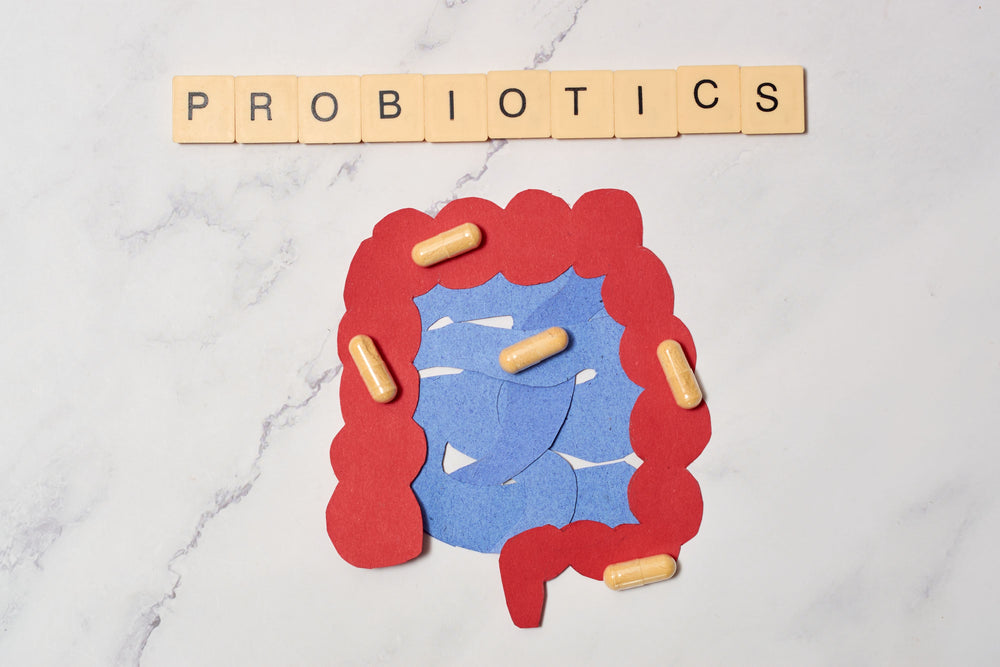
Best Probiotics for IBS Constipation According to Science
If you’re dealing with digestive issues, you’re not alone. It's estimated that up to 10% of people worldwide have irritable bowel syndrome (IBS). A common subtype of this digestive disorder is IBS-C, which is associated with severe constipation and other uncomfortable symptoms.
Feeling backed up all the time can be physically uncomfortable and emotionally draining. Fortunately, you don’t need to settle for subpar digestion. Probiotic supplementation may provide you with some much-needed relief.
Below, we’ll briefly review the symptoms of IBS-C. Then, based on scientific research and other key factors, we’ll examine the best probiotics for IBS constipation.
Understanding IBS-C and Its Impact
IBS-C, also known as Irritable Bowel Syndrome with constipation, is a chronic digestive disorder characterized by the following symptoms:
-
Infrequent bowel movements (often fewer than 3 times per week)
-
Hard or lumpy stools that are difficult to pass
-
Mucus in stool
-
Abdominal pain
-
Bloating and gas
-
Incomplete evacuation
-
Nausea
You don’t need to have all of these symptoms to have IBS-C. Even if you only deal with a handful of symptoms, IBS-C can be very disruptive to your daily routine.
How IBS-C Can Affect Your Daily Life
If you have IBS-C, you know all too well how much it can impact everyday life. Some common struggles include:
-
Social limitations – IBS-C may make you more hesitant to engage in social activities, particularly if sudden symptom flare-ups require you to stay close to a bathroom.
-
Work distractions – IBS-C symptoms can take a large chunk of your mental energy and focus, making it more difficult for you to be productive at work.
-
Emotional distress – Dealing with IBS-C can be stressful. Many people report that this is the worst part of this disorder, especially since stress can worsen your IBS symptoms.
While IBS-C poses many challenges, there’s a light at the end of the tunnel if you’re willing to seek out the right treatment. One of the most popular protocols for relieving IBS-C is taking specific probiotic supplements. Different strains of probiotics work better for some subtypes of IBS than others, so it’s essential to select your strains carefully.
How Probiotics Help with IBS-C
Scientists have yet to determine the exact cause of IBS. However, some research suggests that gut dysbiosis—an overgrowth of “bad” bacteria in your microbiota—may contribute to IBS symptoms. This imbalance can disrupt your gut function, affecting motility, digestion, and immune response.
Bad bacteria are more likely to take over your gut when you, for example, eat a lot of processed foods or don’t intake enough fiber, as well as after a bout of antibiotics.
Luckily, probiotics can help restore balance by replenishing the "good" bacteria in your gut. These beneficial bacteria have been shown to regulate gut motility, reduce inflammation, and improve gut barrier function, all of which are crucial for alleviating IBS-C symptoms.
Read More: Digestive Health Supplements, Ultimate Guide to Choosing the Right One
Can Probiotics Make IBS-C Symptoms Worse?
When you first start supplementing with probiotics, you may experience mild side effects, like diarrhea or gas. These symptoms typically go away once your body adjusts. Immunocompromised people may be at a greater risk of these unpleasant symptoms.
To help manage these side effects, start with a low dose and gradually increase it over time. You can also try taking your probiotics with food. If uncomfortable side effects persist for over a week, try a different probiotic strain or supplement brand.
Aside from these temporary side effects, probiotics are generally considered safe for healthy adults. According to a meta-analysis of 55 studies, people who took probiotics were no more likely to experience adverse events than those who received placebos.
Read More: How Long It Takes for a Probiotic to Work + Telling Signs
6 Top Probiotic Strains for IBS-C
According to scientific studies, these are the most beneficial probiotic strains if you’re seeking IBS-C relief:
-
Bifidobacterium lactis – A four-week study of 1,248 participants found that people who consumed this strain had more bowel movements than those who took a placebo.
-
Bifidobacterium longum – According to a 30-day study, taking one capsule of this strain daily reduced the severity of IBS symptoms and improved participants’ quality of life.
-
Bifidobacterium infantis – When used alongside other strains, Bifidobacterium infantis has been shown to significantly reduce abdominal pain and bloating among IBS patients.
-
Lactobacillus plantarum – A four-week study of this strain found that it may relieve abdominal pain and bloating.
-
Lactobacillus paracasei—In a randomized, double-blind, placebo-controlled study, participants who took this strain saw improvements in their stool consistency and bowel habits.
-
Lactobacillus rhamnosus – By protecting and restoring the gut barrier, this strain can help reduce intestinal permeability, which often worsens IBS-C symptoms.
Read More: The Best Probiotics for IBS Diarrhea [Strains & Brands]
Which Probiotics Should You Avoid With IBS-C?
As we mentioned earlier, some probiotic strains are better suited for people with IBS-C than others. For instance, most Bacillus strains don’t have sufficient evidence to support their use for IBS-C symptoms.
Choosing the Right Probiotic Brand for IBS-C
The strain isn’t the only thing you need to consider when choosing a probiotic supplement. Some other important factors include:
-
CFU count – CFU stands for Colony Forming Units. The higher a probiotic supplement’s CFU count, the more microorganisms it contains.
-
Quality – Since the FDA doesn’t regulate supplements, you can’t assume that all probiotic products contain what they claim. The most reliable way to ensure quality is by selecting a product that has undergone third-party testing.
-
Delivery mechanism – Probiotics are available in capsules, powders, and fermented food. The best delivery mechanism is a matter of personal preference.
-
Additional ingredients – Some probiotic supplements contain other gut-healthy additions, such as prebiotics, digestive enzymes, or antioxidants.
Best Probiotic Supplement for IBS-C
Now that you know what strains are most effective for IBS-C, let’s take a look at four high-quality supplements, along with their key ingredients and notable benefits.
#1 Digestive Vibrance
If you're struggling with IBS-C, Vibrant Health’s Digestive Vibrance is an excellent choice. This plant-based powder supplement is specifically formulated to promote digestive comfort and regularity. It contains 100 billion CFUs of probiotics from eight different strains, including:
-
Bifidobacterium longum
-
Bifidobacterium infantis
-
Lactobacillus plantarum
-
Lactobacillus helveticus
-
Lactobacillus paracasei
-
Lactobacillus rhamnosus
-
Lactobacillus acidophilus
-
Streptococcus
Digestive Vibrance also features antioxidants, prebiotic-rich fermentable fibers, amino acids that help combat inflammation and permeability, and magnesium butyrate, a short-chain fatty acid that helps its probiotics colonize your gut. A two-week supply of this comprehensive blend is available for just $36.40 if you subscribe for regular deliveries.
Other benefits:
-
Third-party tested
-
Vegan
-
Gluten-free
-
Non-GMO
-
Free from common allergens
#2 Align
Align’s 24/7 Digestive Support Probiotic Supplement is a potent capsule designed to relieve occasional gas, bloating, and abdominal pain. Its streamlined formulation focuses solely on delivering probiotics.
While Align doesn’t share its specific CFU count, its capsules contain the well-researched Bifidobacterium strain. A 28-day supply costs $32.49, or $1.16 per capsule.
Other benefits:
-
DNA-tested to guarantee its inclusion of Bifidobacterium 35624
-
Vegetarian
-
Gluten-free
-
Soy-free
#3 Seed
Seed’s DS-01®Daily Synbiotic supports gut health and immune function with 53.6 billion active fluorescent units (AFUs). It contains 24 strains of probiotics that aren’t commonly found in food or other supplements. Better yet, its capsules are carefully engineered to survive digestion.
If you subscribe for monthly deliveries, a 30-day supply of Seed costs $49.99.
Other benefits:
-
Third-party tested
-
Vegan
-
Dairy-free
-
Gluten-free
-
Soy-free
-
Non-GMO
-
Glyphosate-free
-
Free of nuts, shellfish, sesame, and other allergens
-
No binders or preservatives
#4 Primadophilus Probiotic
If you’re looking for a budget-friendly option, Primadophilus® Probiotic is quite cost-effective. For just $23.99, you can get a three-month supply.
This affordable supplement provides five billion CFUs from two different strains: Lactobacillus rhamnosus HA-111 and Lactobacillus acidophilus R0418. However, it also contains milk and soy, so it’s not the best choice for vegans or people with soy or dairy allergies.
Other benefits:
-
Suitable for children 12 and older
-
NSF Certified
Other Ways to Alleviate IBS-C Symptoms
Adding a probiotic to your daily routine can be beneficial, but it’s not the only strategy at your disposal. Some other potential ways to ease IBS-C symptoms include:
-
Making dietary changes, like increasing your fiber intake, drinking more water, and consuming fermented foods.
-
Improving lifestyle factors by exercising and employing effective stress management strategies.
If these healthy habits don’t resolve your IBS-C symptoms, you may also consider contacting a healthcare provider. They can help you get to the bottom of your digestive woes and craft a custom treatment plan.

Why Trust Vibrant Health?
At Vibrant Health, we’ve been pioneers in science-backed nutrition for over 30 years, formulating transparently sourced superfood supplements that prioritize real results. Our blog is an extension of that commitment—a trusted resource for expert-driven wellness insights.
Every article is crafted with nutrition expertise, backed by the latest scientific research, and reviewed by our in-house Certified Health Coaches and Product Educators. We break down complex health topics into practical, actionable advice—helping you make informed choices about superfoods, supplementation, and holistic wellness.As a brand that has earned thousands of 5-star reviews and the trust of health professionals, we ensure that our content reflects the same quality, integrity, and transparency as our products.
Your wellness journey deserves accurate, credible, and empowering guidance. That’s why Vibrant Health’s blog is here—to help you live a healthier, more vibrant life, backed by real expertise


